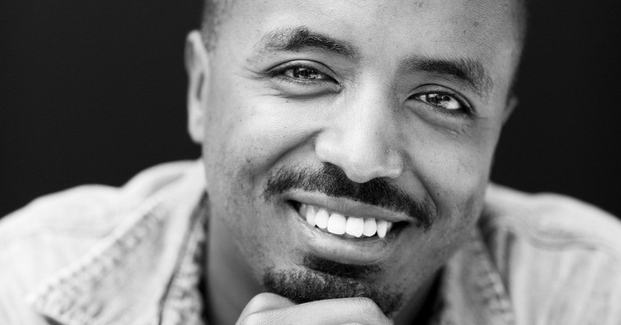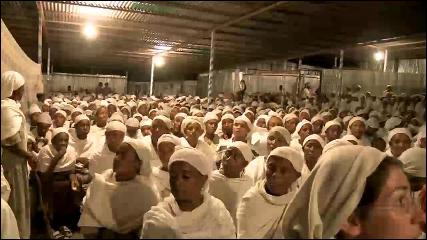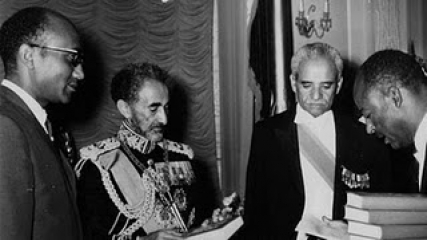Tadias Magazine
Events News
Updated: Friday, May 27, 2011
New York (Tadias) – The 8th Annual Sheba Film Festival featured the New York premiere of Yemane Demissie’s film Twilight Revelations: Episodes in the Life & Times of Emperor Haile Selassie. The screening took place at the Schomburg Center on Thursday, May 26th.
The documentary, which features rare archival footage coupled with exclusive interviews and firsthand accounts, takes a fresh look at the mixed legacy of one of the most controversial African monarchs in modern history. Emperor Haile Selassie is widely admired abroad for his memorable appeal at the League of Nations in 1936 during the second Italian invasion of Ethiopia, as well as for his continental leadership role in the 1950’s and 1960’s during the decolonization of most African countries. History also remembers him for his administrative failures at home and for presiding over one of the most archaic land tenure systems in the world. Although credited for his commitment to establishing modern institutions and nurturing a new class of academics and professionals in Ethiopia, he is also criticized for his prolonged neglect of reform voices and the unsustainable poverty of the vast majority of his people – which would eventually bring about the abrupt and unceremonious end to his rule.
Below is our recent interview with Filmmaker Yemane Demissie who is also an Assistant Professor at the Kanbar Institute of Film & Television at NYU.

Yemane Demissie. (Photo via NYU)
Tadias: It is clear that you’ve made a conscious effort to tell a balanced story. The film documents the highs and lows of the Emperor’s reign. Why do you think people remain fascinated by Haile Selassie almost four decades after he was deposed by a popular revolt?
YD: Apart from the five-year intermission during the Italo-Ethiopian War, the Emperor was in power from 1916 until 1974. That is long enough to make it possible for two generations of Ethiopians to be born and come of age during his reign. But in addition to the length of his sovereignty, his significant national and international contributions, his personality, and his leadership style contribute to the fascination. In the end, however, charisma is never the sum of the parts.
Tadias: The documentary also touches upon the more human side of the person. We hear from some of his family members about his role as a father, other interviewees discuss his daily routine, such as his regular early morning physical exercise, etc. You also incorporate some fascinating images that capture the Emperor in private moments. What do you most want people to take away from this film?
YD: That nearly six decades of leadership cannot be reduced to a triumph, [such as] the 1963 establishment of the OAU in Addis Ababa, or a fiasco, the 1973 famine. That a lot more research is wanting since there is so much we don’t know about the Emperor and his era. I also need not point out that it’s impossible to convey six decades of leadership in 58 minutes, the length of the documentary. That empathy is crucial if one wants to learn.
Tadias: One of the most dramatic moments in the film comes during the 1960 coup attempt against the emperor while he was traveling abroad. We know that you have dedicated a whole movie exploring this subject. Can you tell us a bit about the coup, its leaders, and why the revolt was a significant historical event?
YD: In December 1960, General Mengistu Neway, the head of the Imperial Bodyguard, his younger brother, Ato Girmame Neway, the intelligence tsar, Colonel Workeneh Gebeyehu, and a circle of their supporters attempted to overthrow the Emperor while he was on a state visit to Brazil. When the coup d’état failed, the leaders executed most of the government officials they had detained — including the acclaimed patriot leader, Ras Abebe Aregay — and fled. Ato Girmame Neway and Colonel Workeneh Gebeyehu died before they were captured and their corpses were hung publicly. General Mengistu Neway was taken captive. He was given a trial in which he expressed himself openly. A copy of the trial transcriptions can be found at the Institute of Ethiopian Studies. At the end of the trial, he was found guilty and condemned to death.
For a number of years before the coup, a not insignificant number of the intelligentsia had began to express its discontent and frustration, albeit it discretely, with and about the imperial administration. These young people believed that the Emperor and his administration were, at best, dithering, or at worst, blocking the political, social, economic and cultural changes that they deemed were essential and overdue.
The coup was a significant event for many reasons. I can think of two at the moment: First, the lack of significant civic bodies or institutions, such as independent press, political parties, professional associations, labor unions, in which differing views and proposals could be discussed openly and seriously and then implemented or rejected, encouraged the belief in force as the only path to change. Second, for many of the educated young men and women who came of age immediately following the coup d’état the leaders of the putsch became champions of change.
Tadias: Even though the film consists of several interviews, we do not see the face of the interviewer, and except on two occasions we don’t hear the interviewers voice either. How would the film be different if the audience had heard the questions? How did most of the interviewed individuals react off-camera to the questions?
YD: I used “chapter headings” before each “episode” to make sure that the topic at hand was not confusing. The only time you heard the interviewer’s, my voice, was when its absence would have caused confusion. Had I included my voice, the chain-like flow of the narratives would have been shattered. Many of the responses were selections from much longer explanations and anecdotes. Part of my job as the editor was to distill and synthesize. This approach is not unusual in documentary filmmaking.
Tadias: In the last scene you actively interject and ask a follow-up question. What spurred this break in style?
YD: I decided to use that section because it was moving and powerful. Since Ato Mamo Haile, the interviewee, asked me a question directly, breaking the fourth wall, I had to reply. If I had technically muted my response the segment would not have worked. After experiencing a film in which the subjects addressed an invisible person off camera for about 56 minutes, the shift, with Ato Mamo addressing the camera directly, becomes noticeable and affective. By breaking the fourth wall, Ato Mamo poses a question not only to me but to the viewer. That was why I switched styles.
Tadias: Were there any rules you set for yourself about what you would or wouldn’t discuss on camera?
YD: I wouldn’t say rule but approach. There is vast amount of literature about the Emperor and his era written primarily by journalists or scholars who specialize in that time period. Since that information was readily available, I targeted primary sources or first hand accounts from individuals whose observations were not as readily available.
Tadias: What were some of the biggest challenges in making this film?
YD: One of many [challenges] was constructing a narrative when so many of the key participants were killed by the military junta or have died of old age or poor health without leaving any record of their work or observations.
Tadias: Why did you name the film “Twilight Revelations”?
YD: I hope the answer to that question becomes evident after a viewing of the film.
Tadias: Thank you Yemane and see you on Thursday at the Schomburg Center!
—
If You Go: (This event has passed)
The 8th Annual Sheba Film Festival
The New York premiere of “Twilight Revelations”
Episodes in the Life & Times of Emperor Haile Selassie
Thursday, May 26th, 2011 7PM (Admission: $12)
The Schomburg Center (515 Malcolm X Boulevard, 135th St)
Director Yemane Demissie will be present for the Q&A session following the screening.
Click here to watch the trailer.




